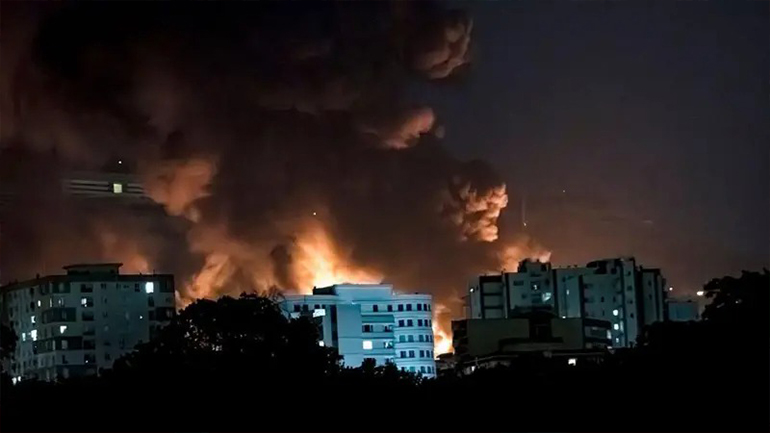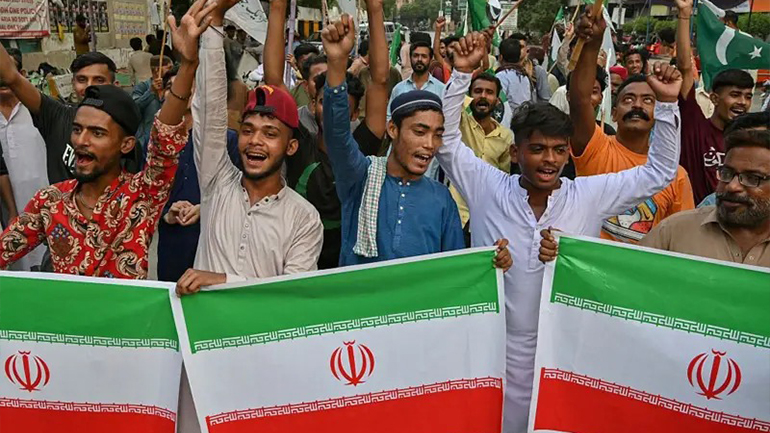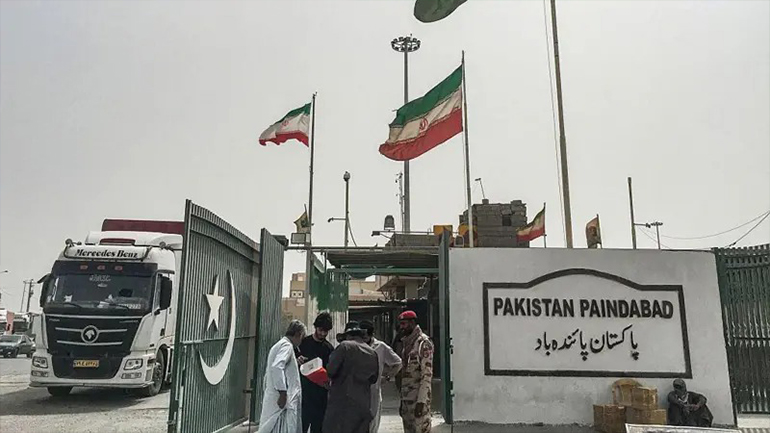

It has now been six days since the Iran-Israel conflict and the exchange of attacks between the two nations began. While Pakistan has openly condemned the Israeli attack on Iran, there is also a growing sense of concern in Islamabad over the escalating tensions. On Wednesday, addressing a meeting of the federal cabinet, Prime Minister Shehbaz Sharif stated that the Iran-Israel war is a threat to regional and global peace, and called on the international community to take immediate steps to stop it. He said, “The situation arising from the Iran-Israel war is deeply concerning. Pakistan strongly condemns the blatant Israeli aggression against Iran and urges the international community to act swiftly for a ceasefire between Iran and Israel.” So far, Pakistan has extended diplomatic support to Iran in this conflict. In a statement issued on June 13, Pakistan’s Ministry of Foreign Affairs said: “It is the responsibility of the international community and the United Nations to uphold international law, halt this aggression immediately, and hold Israel accountable for its actions.” Pakistan also voiced strong condemnation of Israeli attacks during the UN Security Council meeting, expressing solidarity with Iran in clear terms. This week, a video was shared on the official X (formerly Twitter) account of the Iranian Embassy in Pakistan, showing members of the Iranian Parliament chanting “Pakistan Tashakur Tashakur” (Thank you, Pakistan). Iranian President Masoud Pezeshkian, while addressing the Iranian Parliament, thanked Islamabad for Pakistan’s support to Iran during the ongoing conflict between Israel and Iran. Following his speech, Iranian lawmakers chanted in unison: “Pakistan Tashakur Tashakur, Pakistan Tashakur Tashakur.”
Meanwhile, on social media, rumors were circulating claiming that an Iranian military officer had stated that “in the event of a possible nuclear attack on Iran, Pakistan would retaliate with a nuclear strike on Israel.” However, on Monday, during an address in the Senate, Pakistan’s Foreign Minister Ishaq Dar dismissed the claim as “baseless and false,” calling it fake news. The Foreign Minister said, “Pakistan’s nuclear program is a trust of the nation. This program was achieved through great sacrifice by the Pakistani people.” In the midst of all this, while Pakistan continues to extend moral and diplomatic support to Iran, there is an ongoing debate in some quarters about the extent to which Pakistan can support Iran. Is military cooperation possible? And what could be the potential consequences for Pakistan? Meanwhile, U.S. President Donald Trump stated that during his meeting at the White House with Pakistan’s Army Chief, Field Marshal Asim Munir, they also discussed Iran. Trump remarked, “He knows Iran very well... perhaps better than others... and he is not happy with the situation.” It is worth noting that Pakistan and Iran share a border of approximately 750 kilometers, across which a large number of people cross daily. In addition, trade goods, including oil and gas, are regularly imported into Pakistan from Iran.
Speaking on how far Pakistan can support Iran in its conflict with Israel, former ambassador and Executive Director of the Center for International Strategic Studies (CISS) in Islamabad, Ali Sarwar Naqvi, said: “I don’t believe Pakistan would want to take a direct position in the Israel-Iran conflict.” He explained that Pakistan has extended moral support to Iran. According to Naqvi, there are official statements from the Foreign Ministry and the Foreign Minister on record expressing Pakistan’s support for Iran. When asked whether Pakistan could provide military assistance to Iran, he responded: “I don’t think Pakistan would want to get involved in any such way, because Pakistan seeks peace.” “Pakistan does not want war; Pakistan wants peace.” He added that Pakistan would try through the United Nations Security Council to bring about a ceasefire and to halt the actions being taken against Iran.

Smoke is seen rising from buildings after the Israeli attack on Tehran on June 15.
Journalist and analyst Naseem Zehra also appears to agree with Ali Sarwar Naqvi. Commenting on the matter, she said, “Pakistan can only take a position on diplomatic and political grounds, which it already has, at every level. There’s nothing more it can do.” She added that Pakistan is supporting Iran on humanitarian grounds where possible. According to her, due to airspace restrictions, Pakistan offered to allow stranded Iranian pilgrims to land in Pakistan and helped them return to Iran via land routes. Speaking about Army Chief Field Marshal Asim Munir’s presence in the U.S. during this time, she said, “It would make no difference if the U.S. decides to enter the war directly while General Asim Munir is there.” Naseem Zehra further remarked, “Everyone knows Pakistan does what it believes is in its national interest, and General Asim Munir will do the same—he’ll speak in Pakistan’s interest.” When asked whether this war could spill over into Pakistan, she responded that there is no threat of the war expanding into Pakistani territory. “Even if the war spreads, it will likely do so at sea. If Iran tries to close the Strait of Hormuz, the U.S. will surely respond militarily, but Pakistan will remain distant from it.”
Commenting on the potential challenges for Pakistan arising from the Israel-Iran conflict, former senator Mushahid Hussain Syed said, “The region is becoming destabilized due to Israeli aggression, just as it was last month because of Indian aggression against Pakistan.” He added, “In the past, we saw how Afghanistan suffered for decades from external interference, leading to regional instability. And since Iran is a neighboring country, whatever happens there will impact Pakistan as well.” On the other hand, Ali Sarwar Naqvi believes that the Israel-Iran conflict will not directly affect Pakistan. However, “Being a neighboring country, Pakistan is bound to feel some indirect effects of what happens in Iran.” “There may be economic consequences, such as rising oil prices, but there will be no direct impact,” he stated. Regarding Pakistan’s support for Iran in this war, Senator Mushahid Hussain Syed said, “Pakistan is offering full political and diplomatic support to Iran, which is the right approach given Iran is a friendly neighboring country.” “We have done the same in the past for Afghanistan, and now we are doing it for Iran.” He claimed, “We must not forget that during the 1965 and 1971 wars, when Pakistan faced Indian aggression, Iran provided Pakistan with strategic depth, even allowing PIA aircraft to be stationed in Iran.” He concluded by saying, “That is why Pakistan became the first parliament in the world to offer full moral, political, and diplomatic support to Iran on this issue—and the Iranian Parliament also acknowledged and appreciated this gesture.”

Mushahid Hussain Syed further stated that Iran is capable of defending itself against Israeli aggression. “In my opinion, Iran is a strong country. They have people who are ready to fight for their homeland. They have every right to defend themselves. Iran possesses military capabilities and also the will to protect its sovereignty.” Commenting on Iran’s retaliatory missile strikes, he said that after Iranian missiles fell on Israeli cities, “Israel is now getting a taste of its own medicine. They must be realizing that when you initiate something, it can have consequences that you cannot control.”
Pakistan’s Balochistan province shares borders with Iran across five districts: Gwadar, Panjgur, Kech, Washuk, and Chagai. Earlier this week, correspondent Mohammad Kazim reported that, in light of the Iran-Israel war, authorities had temporarily closed the border crossing points with Iran in the adjoining regions until further notice. Government officials stated that due to the situation in Iran, Pakistani citizens are not allowed to enter Iran, though there is no restriction on Pakistanis returning from Iran. However, on Wednesday night, the Foreign Office issued a clarification on X (formerly Twitter), saying that all border crossing points between Pakistan and Iran remain fully operational. Every year, millions of Pakistanis travel to Iran for pilgrimage. According to the Pakistani embassy in Iran, around 4,000 to 5,000 Pakistani pilgrims were in Iran at the time of Israel’s attack, some of whom have already returned, while others are on their way back. Additionally, thousands of Pakistani nationals reside in Iran for education, business, or employment. According to the Overseas Pakistanis Foundation, 35,000 Pakistanis were living in Iran in 2023, some of whom hold dual nationality. Moreover, about 1,000 Pakistani students are enrolled in Iranian universities, many of whom have begun returning home due to escalating tensions. According to Pakistani officials, over 460 students have returned via Zahedan and Chabahar, most of whom were studying medicine in Iran.

Pakistani security officials are checking the documents of passengers arriving from Iran.
Despite sharing a long border, relations between Pakistan and Iran have not always been ideal. Iran was the first country to recognize Pakistan as an independent state in 1947, and during the 1965 war between India and Pakistan, Iran supported Pakistan. However, after the 1979 Islamic Revolution in Iran, Pakistan grew closer to Saudi Arabia. According to the International Institute for Strategic Studies (IISS), a major source of tension between the two countries is Pakistan’s tilt toward Saudi Arabia, a traditional rival of Iran. An IISS paper notes that the Islamic Revolution of 1979 had a direct impact on Pakistan-Iran relations. In the past, both Pakistan and Iran have accused each other of supporting militant groups, and their security forces have carried out operations across each other’s borders. In January of last year, relations became even more strained when both countries carried out airstrikes on each other's territory. However, the political leadership on both sides soon worked to de-escalate the situation. In May of this year, during Pakistan’s military tensions with India, Iran chose not to take sides.
Powered by Froala Editor